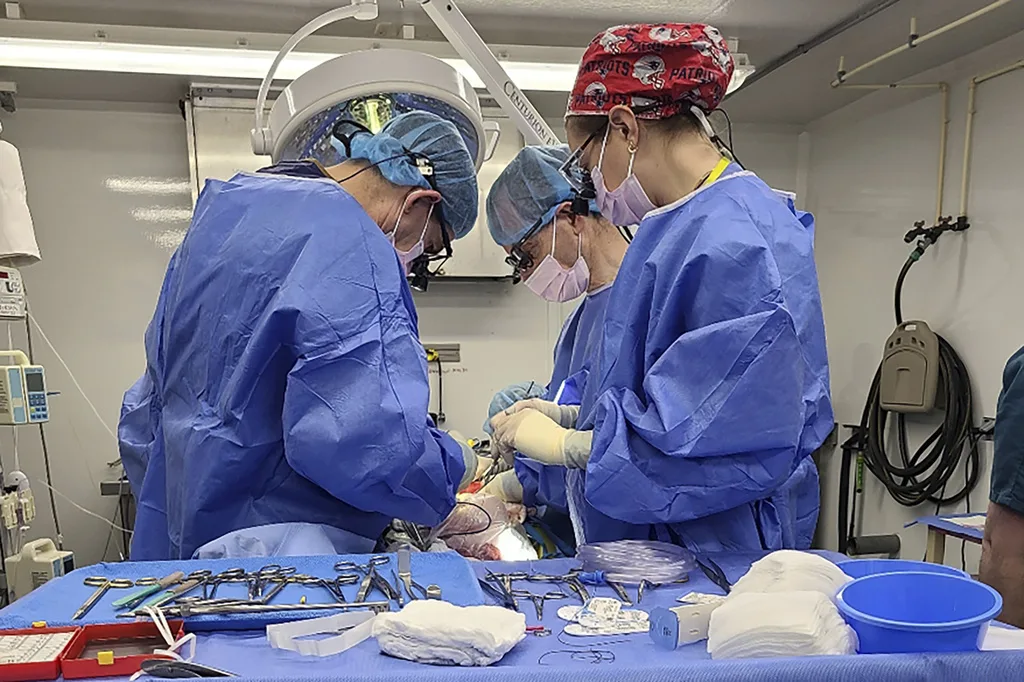
In this photo provided by eGenesis, a genetically modified pig liver is removed in Massachusetts for transportation to the University of Pennsylvania in Philadelphia in December 2023. On Thursday, Jan. 18, 2024, the university announced surgeons externally attached the pig liver to a brain-dead human body and watched it successfully filter blood, a step toward eventually trying the technique in patients with liver failure. (eGenesis via AP)
Surgeons at the University of Pennsylvania used a pig liver outside a brain-dead human body to filter blood, taking a step toward eventually trying the technique in patients with liver failure.
Surgeons at the University of Pennsylvania announced the success of a novel experiment Thursday, having attached a pig liver to a brain-dead human body and watched it filter blood.
The experiment was a different spin on animal-to-human organ transplants in that the pig liver was used outside the donated body, not inside, taking a step toward eventually trying the technique in patients with liver failure. This approach is a way for doctors to create a “bridge” to support failing livers by doing the organ’s blood-cleansing work externally, much like dialysis for failing kidneys.
Animal-to-human transplants, called xenotransplants, have failed for decades because people’s immune systems rejected the foreign tissue. Now scientists are trying again with pigs whose organs have been genetically modified to be more humanlike.
In the Penn experiment, researchers attached a liver from a pig — one genetically modified by eGenesis — to a device made by OrganOx that usually helps preserve donated human livers before transplant.
The family of the deceased, whose organs weren’t suitable for donation, offered the body for the research. Machines kept the body’s blood circulating.
The experiment, conducted last month, filtered blood through the pig liver-device for 72 hours. In a statement, the Penn team reported that the donor’s body remained stable and the pig liver showed no signs of damage.
In recent years, kidneys from genetically modified pigs have been temporarily transplanted into brain-dead donors to see how well they function, and two men received heart transplants from pigs although both died within months.
The US Food and Drug Administration is considering whether to allow a small number of Americans who need a new organ to volunteer for rigorous studies of either pig hearts or kidneys.
Some researchers also are looking to use pig livers. A liver has different complexities than kidneys and hearts: It filters blood, removes waste and produces substances needed for other bodily functions. About 10,000 people are currently on the national waiting list for a liver transplant.
Politics

Pennsylvania redesigned its mail-in ballot envelopes amid litigation. Some voters still tripped up
HARRISBURG, Pa. (AP) — A form Pennsylvania voters must complete on the outside of mail-in ballot return envelopes has been redesigned, but that did...

Biden makes 4 million more workers eligible for overtime pay
The Biden administration announced a new rule Tuesday to expand overtime pay for around 4 million lower-paid salaried employees nationwide. The...

Malcolm Kenyatta makes history after winning primary for Pa. Auditor General
State Rep. Malcolm Kenyatta, who was first elected to the state House in 2018, won the Democratic nomination for Pa. Auditor General and will...
Local News

What do you know about Wawa? 7 fun facts about Pennsylvania’s beloved convenience store
Wawa has 60 years of Pennsylvania roots, and today the commonwealth’s largest private company has more than 1,000 locations along the east coast....

Conjoined twins from Berks County die at age 62
Conjoined twins Lori and George Schappell, who pursued separate careers, interests and relationships during lives that defied medical expectations,...






